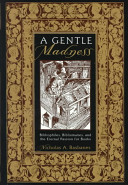Today’s featured book is “A Gentle Madness: Bibliophiles, Bibliomanes, and the Eternal Passion for Books” by Nicholas A. Basbanes.
It is appropriate that the front cover of A Gentle Madness features an image attributed to the artist Haintz-Nar-Meister titled “Of Useless Books”. This print was featured in Sebastian Brant’s 1494 book “The Ship of Fools”. Brant created a monastic poem that featured more than 100 follies and vices practiced by “fools” of the day. One folly that has carried down through the ages is the vice of book mania.

Basbanes charts the history of this madness, carefully documenting great collectors who participate in the only hobby that has a disease named after it and the libraries they created. Our library has the first edition of this tail of strange and wonderful characters who have pursued the passion of collecting books. This is a fascinating read but does not provide any antidote to bibliomaina as we can personally confirm.

DLWA Call Number: Z992 .B34 1999
Amazon.com: Link
- Title: A Gentle Madness: Bibliophiles, Bibliomanes, and the Eternal Passion for Books
- ISBN: 0805036539 (ISBN13: 978-0805036534)
- Language: English
- Setting: book collecting
- Literary awards: finalist for the 1995 National Book Critics Circle award
–DLW

